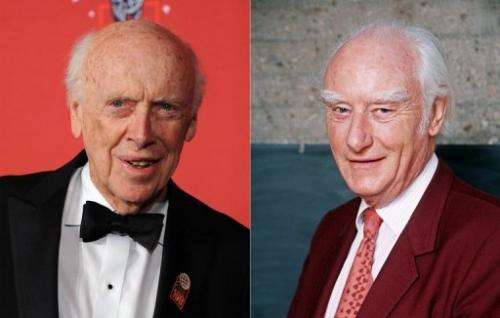DNA breakthrough spelt double trouble for Nobels

The discovery of the DNA double helix 60 years ago proved to be a headache for the Nobel organisation as the feat became nominated for prizes in different categories at the same time, Nature reported on Wednesday.
Francis Crick and Maurice Wilkins of Britain and James Watson of the United States shared the Nobel Prize for Medicine in 1962, nine years after revealing that the code for life has a spiral-staircase structure joined by chemical rungs.
But two researchers who delved into the award process were stunned to find that the trio were simultaneously nominated for the Nobel Prize for Chemistry that same year.
"The fact that the double helix was the subject of nominations for both prizes must have presented a dilemma for the two [award] committees," Alexander Gann and Jan Witkowski of Cold Spring Harbor Laboratory in New York report in a letter to the journal.
The evidence comes from a letter that French geneticist Jacques Monod wrote to the Nobel Committee for Chemistry, nominating the trio for the chemistry award. Gann and Witkowski found the letter in the archives of the Pasteur Institute in Paris.
In the event, the 1962 chemistry Nobel went to Max Perutz and John Kendrew for work on haemoglobin and myoglobin.
The only person to have won the Nobel in different categories of science is Marie Curie, who in 1903 shared the physics award with her husband Pierre and Henri Becquerel, and in 1911 was the sole winner of the chemistry prize.
Separately, Gann and Witkowski say that Crick wrote a nine-page letter to Monod on December 31 1961 to describe his joint quest with Watson to identify DNA.
In his letter, Crick "acknowledges the importance" of X-ray imaging by Rosalind Franklin in determining "certain features" of DNA's structure, the pair say.
Franklin has become a cause celebre among some feminists, who say Crick, Watson and Wilkins snubbed her and never acknowledged her vital contribution.
Franklin has even been dubbed "the Sylvia Plath of molecular biology," a reference to the then-overlooked American writer who took her own life in 1963 during a stormy marriage to fellow British poet Ted Hughes.
Franklin in any case could not be considered for a Nobel in either category, as she died in 1958 and the prize is never awarded posthumously.
Watson and Crick, theoreticians at the legendary Cavendish Laboratory at the University of Cambridge, published their landmark paper in Nature on April 25 1953.
In it, they acknowledged that their thinking had been "stimulated" by X-ray diffraction images provided by the laboratory at King's College London that was headed by Wilkins and where Franklin worked.
The wrangle over how to honour research in DNA half a century ago has amplified since then.
Genetics reaches into dozens of areas, from anthropology and psychiatry to crime detection and agriculture, not just medicine.
As a result, the Nobel science awards are often criticised today for being locked into 19th-century categories that fail to give a slot to the newer discipline of life sciences.
Journal information: Nature
(c) 2013 AFP


















